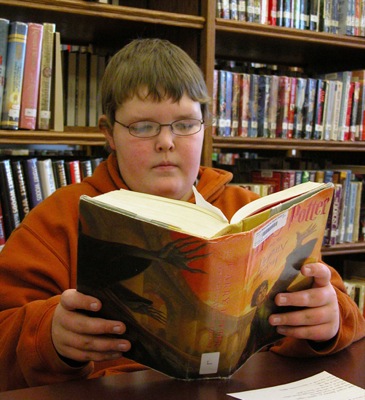Wednesday, January 16th, 2008
Local counselor feels parents need to set limitations
By Pat Royse
In spite of some obvious benefits, if parents don't set boundaries on young people's use of electronic gadgets, we may be in trouble, local counselor Aaron Kuhn told parents Monday night.
He was at the Celina High Academic Motivational Promoters (CHAMP) meeting to discuss how the technology of today affects young people.
To frame the scope of the involvement with electronics, Kuhn said Americans spent $22 billion dollars on such things as MP3 players, cell phones, electronic games and computers during the recent holiday season.
In 2007 the average age for a child to get his or her first cell phone was 6.7 years, and 99 percent of all 16-year-olds now own a cell phone. There are 60 million photos uploaded weekly on Facebook, an Internet social networking Web site for young people. More than 50 percent of Americans play electronic games about seven hours every week. And in 1999, there were 149 million home computers, Kuhn said.
"Who knows how many there are now?" he asked.
But technology is here to stay and today's youth need to know how to use it to be ready for the jobs of the future, said Kuhn. There are positives and negatives that go with it.
As a counselor with a psychotherapy and counseling service in Celina for children and adults, he sees more of the problematic issues than most. He has had spouses leave marriages for online relationships, parents detached from the family due to such things as fantasy football or online gambling and children who have become disengaged from the family and slipping in school work.
Kuhn looked at research in the field, but said some of the technology is so new that more time is needed before we can pass judgment with authority.
One study on text messaging found it contributed to poor spelling, lack of vocabulary development and rapid fire responses that don't promote thinking something through. On the good side, the study said it was making the language more efficient.
Recent studies of computer use said all kids are more aggressive online, many heavy users don't learn non-verbal communication skills and their isolation hinders learning assertiveness. While they may be aggressive online, they don't know how to stand up for themselves in person, Kuhn said.
Electronic game playing, which has been around longer than some gadgets, teaches rapid decision making, multi-tasking, multi-culturalism (gaming is worldwide), staying on task to resolve a dispute and working together, Kuhn said. (Kuhn admits to doing a little electronic game playing himself.)
But games that are violent, aggressive and depict killing teach that to children. Children who play violent games have increased hostility, will argue with teachers, will get in physical fights with their peers and will perform poorer in school, he said research shows.
Do not allow violent video games and television shows, Kuhn advised.
Parents need to set limits on their kids Internet use, he said. What should be non-negotiable is that parents can read anything on the computer. Tell them "I'm going to read your e-mail, blogs and chats" and do it at least once every two weeks. Post the rules of the computer and other technology gadgets in detail. Set a time limit for Internet use. Kuhn likes one hour online per day for teens, less for younger children.
Parents need to know what their kids are typing, he advised.
"Do you know what POS (parent over shoulder) means?" Kuhn asked the audience. Several members did. They also knew G2G (got to go) and some of the acronyms for less savory messages. They also should know the emoticons, symbols such as :[ which means (I am) despondent, he said.
Kuhn believes there is an Internet addiction, although it is labeled as an impulse control disorder. Some of the signs are disobeying time limits, preference to be online rather than with family, the majority of friends are online, grades suffer, there is a marked social withdrawal, he or she is alone on the computer a large amount of time and there is increased tension when not online.
Kuhn ended his presentation with a short list of parenting advice.
Parents need to be the model, he said. Avoid chastising. Just remember that 'No!' is a complete sentence. Overindulging only facilitates self-centeredness.
"If there are no boundaries (on electronic equipment and gadgets), some people are going to abuse them," Kuhn said.



